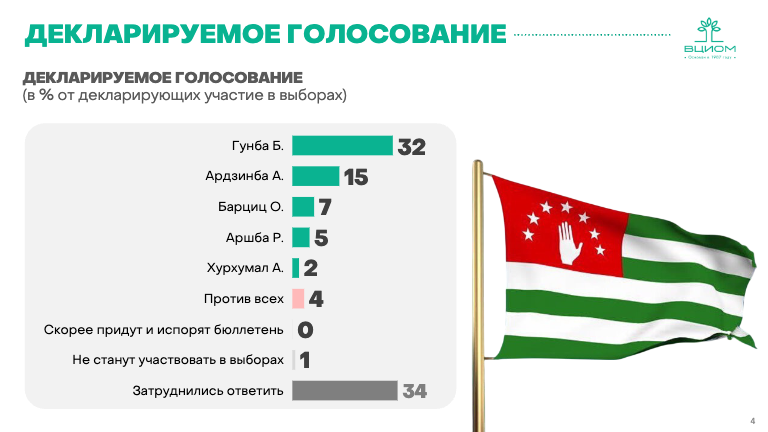Controversy Surrounds VTsIOM Election Poll in Abkhazia

The upcoming presidential election in Abkhazia, set to take place on 15 February 2025.
SUKHUM / AQW’A — The All-Russian Centre for Public Opinion Research (VTsIOM) recently published results of a poll ahead of Abkhazia's presidential election, scheduled for 15 February. While the survey was broadcast on Russian and pro-government media channels, its credibility has come under scrutiny, with officials and residents questioning its transparency and methodology.
The poll, which claimed to have surveyed 1,634 citizens of Abkhazia aged 18 and older, indicated that Badra Gunba, the ruling party’s candidate, leads with 32% of the vote, followed by opposition leader Adgur Ardzinba at 15%. However, scepticism about the survey’s findings is widespread, especially given the lack of regular and reliable sociological studies in Abkhazia. Critics argue that no detailed information about the methodology or sampling has been made available, raising questions about its validity.
The Central Election Commission (CEC) of Abkhazia issued a statement condemning the VTsIOM poll, stating that it violates Abkhazian electoral laws. According to the CEC, the survey was not coordinated with the State Committee on Statistics, the authorised body for such activities, and thus breaches existing legislation.
The CEC called on citizens to refrain from participating in telephone or social surveys aimed at identifying voter preferences. It also reminded the public that, under the Constitutional Law of the Republic of Abkhazia "On Elections of the President of the Republic of Abkhazia," publishing the results of public opinion polls related to the election is prohibited within 10 days of the vote.
“The dissemination of such surveys undermines the integrity of the electoral process and contradicts the legal framework established to ensure free and fair elections,” the statement emphasised.

The VTsIOM poll results were published on 23 January 2025.
Prior to the publication of VTsIOM’s poll, residents of Abkhazia reported receiving unsolicited phone calls, allegedly asking about their political preferences and opinions on the upcoming election. The calls, described as intrusive and persistent, were highlighted in local Telegram channels and Facebook groups, sparking public outrage and demands for clarification from the State Security Service (SGB).
“Who is calling us, asking whom we will vote for, and how did they get access to our personal phone numbers?” questioned Victoria Ardzinba, a concerned citizen. Another resident shared: “A woman called, claiming to be conducting a survey about the country’s situation. I didn’t answer her questions and hung up, as did many others.”
The unsolicited nature of the calls and the lack of clarity about their organisers have led many to suspect an attempt to influence the election process. The Telegram channel Okno commented, “This level of interference can be seen as an attempt to influence the electoral process.”
The legitimacy of the VTsIOM poll has been further questioned due to concerns over its methodology. Critics argue that such surveys often combine partially accurate data with misleading information to shape public perception. Local public figure Tengiz Dzhopua dismissed the poll as a “planned and orchestrated campaign with indirect involvement of the population,” likening its methods to those used in disinformation campaigns.
“The goal is to create a false perception of events or processes. Do not believe it,” Dzhopua stated.
The calls have also raised concerns about potential data breaches. Residents and activists are demanding an explanation from Abkhazia’s State Security Service about how personal phone numbers ended up in the hands of external entities.
In response to growing concerns, Abkhazia’s Central Election Commission (CEC) has urged citizens not to participate in such surveys, emphasising the importance of protecting the integrity of the electoral process.
The rare use of public opinion polls in Abkhazia has only heightened scepticism. With no established culture of regular sociological studies, the results of surveys, especially those conducted externally, often face significant public backlash.
The controversy surrounding VTsIOM’s poll and the unsolicited phone calls has added to growing tensions ahead of the presidential election.